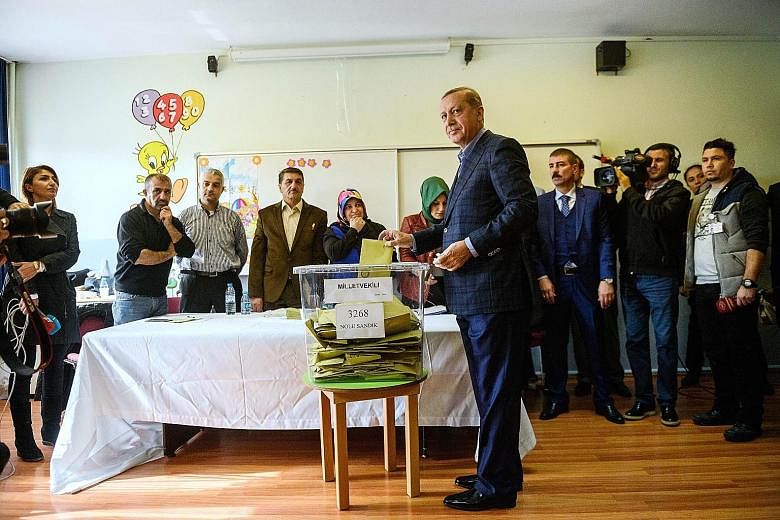ISTANBUL • Turks went to the polls in a snap parliamentary election yesterday under the shadow of mounting internal bloodshed and economic worries, a vote that could determine the trajectory of the polarised country and of President Recep Tayyip Erdogan.
The vote is the second in five months, after the Justice and Development Party (AKP) founded by Mr Erdogan lost in June the single-party governing majority it has enjoyed since first coming to power in 2002.
Since then, a ceasefire with Kurdish militants has collapsed, the war in neighbouring Syria has worsened and Turkey - a Nato member state - has been hit by two suicide bomb attacks linked to the Islamic State in Iraq and Syria that killed more than 130 people.
Investors and Western allies hope the vote will help restore stability as well as confidence in the economy, allowing Ankara to play a more effective role in stemming a flood of refugees from neighbouring wars into Europe and helping in the battle against ISIS militants.
This time, there have been few of the flags, posters and campaign buses that thronged the streets in the build-up to June's vote. But Mr Erdogan has framed this sombre re-run as a pivotal opportunity for Turkey to return to single-party AKP rule after months of political uncertainty.
"It is obvious in today's election how beneficial stability is for our nation and today our citizens will make their choice based on this," Mr Erdogan told reporters after voting in his home district of Camlica on the Asian side of Istanbul.
Flanked by his wife in a gold-coloured headscarf, he voted under tight security with snipers watching from nearby rooftops.
Voters were sharply divided in their views on a return to single- party rule or the prospect of a coalition.
"The little welfare, better living conditions, bigger house and fancier appliances we have, we all owe it to AK Party and Erdogan," said Ms Nurcan Gunduz, 24, at the airport in Ankara.
But 62-year-old Mr Yasar, a retired labourer now working as a shoeshine man outside a mosque in the conservative Istanbul district of Uskudar, said he switched his vote to the main opposition CHP in hopes of a coalition.
"I have given up on the AKP," he said. "The honest party is the CHP. The country needs to heal its wounds and a coalition is the best way."
Some Western allies, foreign investors and Turks see an AKP coalition with the CHP, or Republican People's Party, as the best hope of easing sharp divisions in the European Union-candidate nation, and say it could keep Mr Erdogan's authoritarian instincts in check.
The election was prompted by the AKP's inability to find a junior coalition partner after the June outcome. Mr Erdogan's critics say it represents a gamble by the combative leader to win back enough support so the party can eventually change the Constitution and give him greater presidential powers.
Many polls suggest that while support for the centre-right, Islamist-rooted AKP may have inched up, the result is unlikely to be dramatically different from June, when it took 40.9 per cent of the vote.
However, one survey released on Thursday suggested there had been a late surge in backing for the AKP and that it could take as much as 47.2 per cent, comfortably enough to secure more than half of the 550-seat Parliament.
Whatever the outcome, deep polarisation in Turkey - between conservatives who champion Mr Erdogan as a hero of the working class, and Western-facing secularists suspicious of his authoritarianism and Islamist ideals - is likely to remain.
"The political uncertainty, growing social divisions and insecurity which have characterised the period between the two elections seem set to continue," Mr Bulent Aliriza, director of the Turkey Project at the Washington-based think-tank CSIS, said in a note last Friday.
The pro-Kurdish HDP, which entered Parliament as a party for the first time in June, scaled back its election campaign after its supporters were targeted in the Ankara suicide bomb attack that killed more than 100 people.
"What all Turkey wants and needs more than anything is peace and calm," HDP leader Selahattin Demirtas said after voting in Istanbul. "I hope good election results will give solace to the suffering families of those who gave their lives for peace, freedom and democracy."
REUTERS

